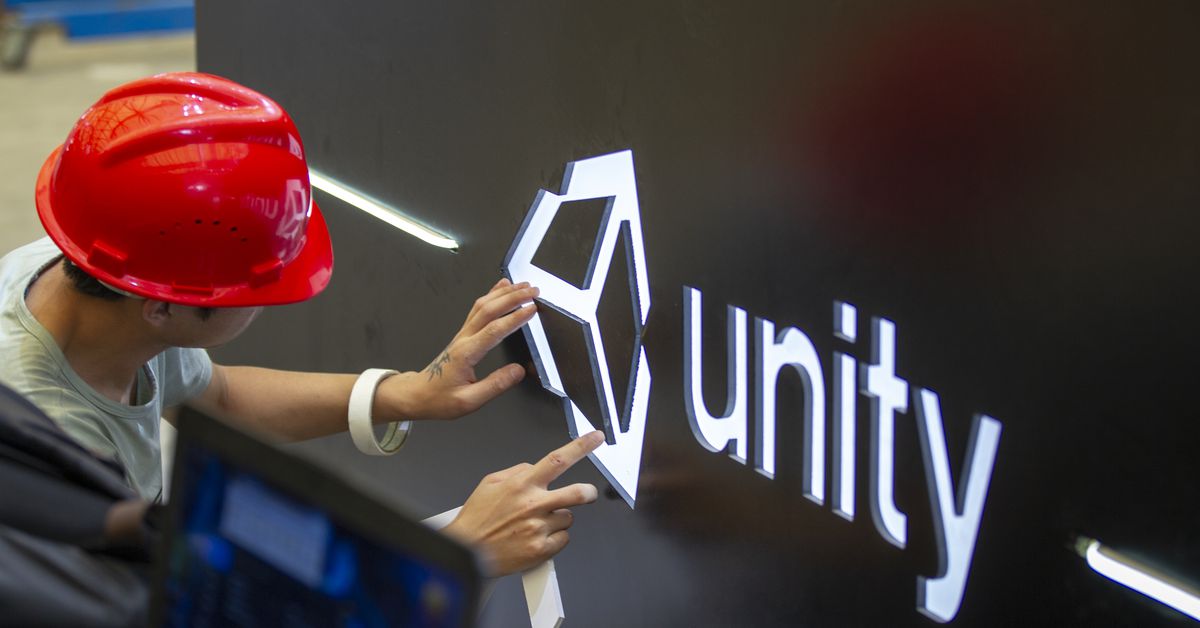After two weeks of chaos, Unity Create president Marc Whitten has a message: “I’m sorry.”
Whitten’s apology, and a revised pricing policy, comes after a tumultuous period for the company, as game makers who rely on Unity panicked over the impact of its controversial “Runtime Fee.” Unity Technologies announced Friday that it will no longer force developers into that fee structure for the current version of its Unity software — but said that the fee will apply to future versions of the engine, should a developer choose to update. However, people using Unity Personal won’t have to pay at all. (Developers can use Unity Personal, the free version of the engine, as long as their company’s combined funding and revenue stays below $200,000 — an increase from the current $100,000 cap.)
Unity also said that for situations where the Runtime Fee does apply, it will kick in only when a project has met two thresholds: $1 million in gross revenue over the past 12 months, and 1 million initial engagements (which is the fancy, but more precise, term that Unity is using in place of “installs”).
Developers on the Unity Pro and Unity Enterprise plans will only see fees starting with the next version of Unity, which is called 2023 LTS and is expected to ship in 2024. (An early access version, 2023.1 Tech Stream, is available for developers now, however.) They’ll be able to choose either the Runtime Fee as calculated by the installs or a 2.5% revenue share. Unity also vowed that it will always charge developers the lower amount between the revenue share and the Runtime Fee.
Unity expects developers to self-report this information from “data [they] already have available.” On a separate Q&A page, Unity said it’s working with its customers and partners to create “tools and processes” to assist in collecting and reporting this data. The company recommended that developers estimate those initial engagements through units sold and first-time user downloads. (It has provided a Runtime Fee estimator for developers looking to calculate the financial impact.)
Games on subscription services, like Xbox Game Pass or Netflix Games, will have to pay the Runtime Fee, Unity clarified. The company said that studios should talk to publishers “to work with Unity on a mutually-beneficial agreement” regarding the fees.
There’s a lot of nuance to the updated policies themselves, but the main takeaway is that only developers that make more than $1 million and have more than 1 million installs will have to pay up — either via the 2.5% revenue share or the calculated Runtime Fee. Whitten will host a fireside chat on Friday at 4 p.m. ET on YouTube to answer questions related to the policy update.
Unity is a game engine that’s widely used by game makers — from big AAA studios like Activision Blizzard on Hearthstone and massive mobile hits like Pokémon Go from Niantic, to indie games like Isometricorp Games’ Tunic and Studio Pixel Punk’s Unsighted. Unity, for some time, has been known as a tool that’s accessible and open to indie developers. The company has had issues, like a massive layoff and CEO John Riccitiello’s big PR oopsie last year, but nothing yet has come anywhere close to the widespread anger that the recently announced policy change invoked.
Unity Technologies’ big mess began on Sept. 12, when the company announced its new, install-based pricing model. The plan would have required developers to pay Unity a fee each time a game was downloaded, once certain revenue and download thresholds were met. Developers said this would have been disastrous to their business, but in addition to the financial concerns, they felt that Unity had also communicated poorly — key details, such as how Unity intended to track this data, appeared to be missing. (Later, Unity changed course to say that it would have developers track the data themselves.) The Unity community at large felt betrayed by the lack of transparency over the new policy, and that the company was changing the terms of service that developers and studios had agreed to when initially deciding to use the game engine.
The response so far to Friday’s update has been much more mixed than the overwhelmingly negative response to the initial Runtime Fee announcement. Some developers are glad to see Unity walk back a number of the initial changes and issue terms that they see as more fair. Others feel that Unity has already used up all of its goodwill.
“Sadly, Unity is also unwilling to openly communicate with its community in a true dialogue to find common ground and a workable solution,” Nikita Guk, representing a group of mobile developers protesting the Runtime Fee, told Polygon on Friday regarding Unity’s latest update. “Instead, it chose again to inform its community of its changes as a fact. The market rules are simple – everyone prefers to do business with partners whose changes in terms and conditions are transparent and consider developers’ interests.”
Correction: This story has been updated to clarify that Unity Personal members’ company revenue must stay below $200,000 to qualify for the free tier.

